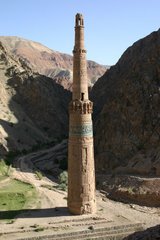A lot can happen in a week in Kabul, and equally, very little. Having hit the ground running, we've stalled, in the face of bureaucracy, obstructionism, power-games, miscommunication (to put it politely) and security issues - I'll expand on some of those over a beer next time I catch up with you!
The upshot of it all is that we're still waiting for final approval to go to Ghur (getting there safely being one of the main sticking points) and the seminar series in the uni has had to be postponed, because of a month of exams which start in a couple of days - it seems that nobody thought about the exams when we agreed dates in May. Needless to say, I'm not best pleased.
On the positive side, the presentation I gave at the embassy seemed to go well, and we'd numerous useful and interesting chats afterwards. We've been round to DAFA, the French archaeological institute, scoffed all their croissants and drooled over their set-up, library and fieldwork results. Fiona has been through the figurine catalogue in the museum and we're finalising the insertion of the Dari into the educational booklets prior to printing, although font issues resulted in my killing my compoota in the process. Thank goodness for portable HDs and the availability of software, which have partly salvaged the situation.
I'm also due to record a presentation on Jam for Afghanistan TV's Toward Open University series - apparently they reach an audience of 25 million, when the schedule doesn't clash with Grey's Anatomy.
I've not been able to take any photos around town yet, partly because I've been rushed off my feet and not had the chance to read the manual for my new camera. Photography is possible, apart from the fact that you obviously don't want to snap military installations - guard posts are strategically positioned outside quite a few buildings in virtually every street. Plus you don't want to insult people by treating them like curiosities in a zoo. But check out Travis Beard's blog / Aina Photography for some proper photos...
www.ainaphoto.org
www.picturetank.com/travis
www.argusphotography.blogspot.com
Kabul is kind of growing on me - it has "character"! The city bustles, when not snarled up in grid-lock, and has a fairly relaxed feel to it - I certainly don't feel in any more danger here than say in Belfast in the 80s. Unsurprisingly, there is less war damage and dereliction than in 2003, although much 'tidying up' still needs to be done, and the guys levelling collapsed concrete blocks of shops with a sledgehammer have their work cut out. Many parts of the city are a dump (literally and metaphorically), with open sewers, potholed roads / dirt lanes and ramshackle stalls and homes. On the other hand, offensively ostenatious, glass-fronted malls and OTT pseudo-palaces have also sprung up since I first came here - I'm not sure whether that's progress or not, given the dubious source of some of the money.
Tenacious beggars ambush you when you step out of the vehicle - some are more needy than others, I suspect, although I was accused of being callous yesterday 'cos I said that the women who can dissolve into 'woe is me' tears (and out again at the drop of a hat) give me the shits. I also took offense at the kids who resorted to some very ungrammatical abusive language when they didn't get what they wanted. Several Afghans we've talked to have asked us not to give money to beggars (esp. kids) in general, because of the dependency culture that engenders and the risks of petty theft. Needless to say, we don't always follow that understandable principle - I tend to give small change to old people and amputees, Alison favours the mothers and Iain the street urchins.
Alison feels that there are fewer women on the streets than before, although those that you do see about are by no means all burqa'ed. The uni has numerous confident, even sassy, female students wandering around with headscarves slipping scandalously low, although the mere fact that they have such educational possibilities means that they are the exception rather than the rule. It will be interesting to see how they are in the seminars.
My favourite mis-spelt sign thus far is "Kichken", presumably a hybrid between kitchen and chicken, while Leslee loves the "Clean and Tasty" Afghan chicken.
Anyway, today's a new day - we're checking out flight possibilities to Ghur and I'd better write my tv lecture. All is not lost, although the past few days have been somewhat exasperating, to say the least.
Take care
D
 The last week of the season was predictably hectic - apologies for the dearth of new postings.
The last week of the season was predictably hectic - apologies for the dearth of new postings.
 Despite all the problems we encountered this season, we achieved our primary objective - everyone got home safely, without incident (apart from various credit cards taking a hit in Dubai). The fact that we also managed to get a significant amount of research and documentation done during the month is testimony to the team's hard work and patience, for which Alison and I are very grateful.
Despite all the problems we encountered this season, we achieved our primary objective - everyone got home safely, without incident (apart from various credit cards taking a hit in Dubai). The fact that we also managed to get a significant amount of research and documentation done during the month is testimony to the team's hard work and patience, for which Alison and I are very grateful.

























